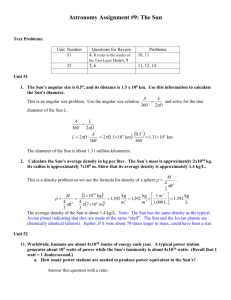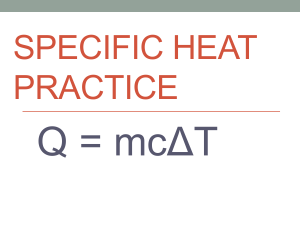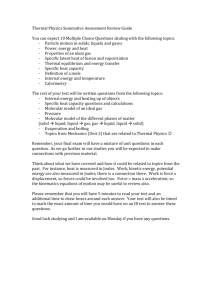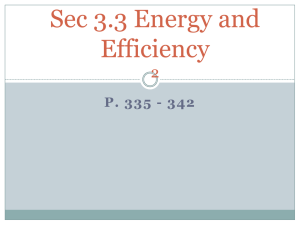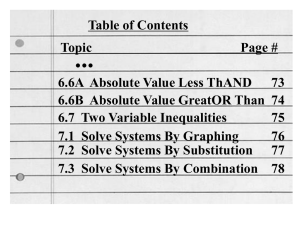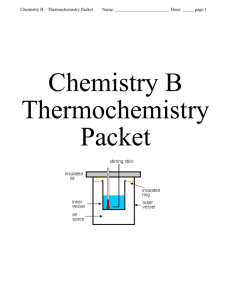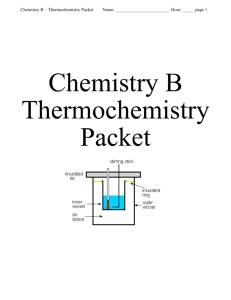Specific Heat and Energy Calculations Worksheet
advertisement
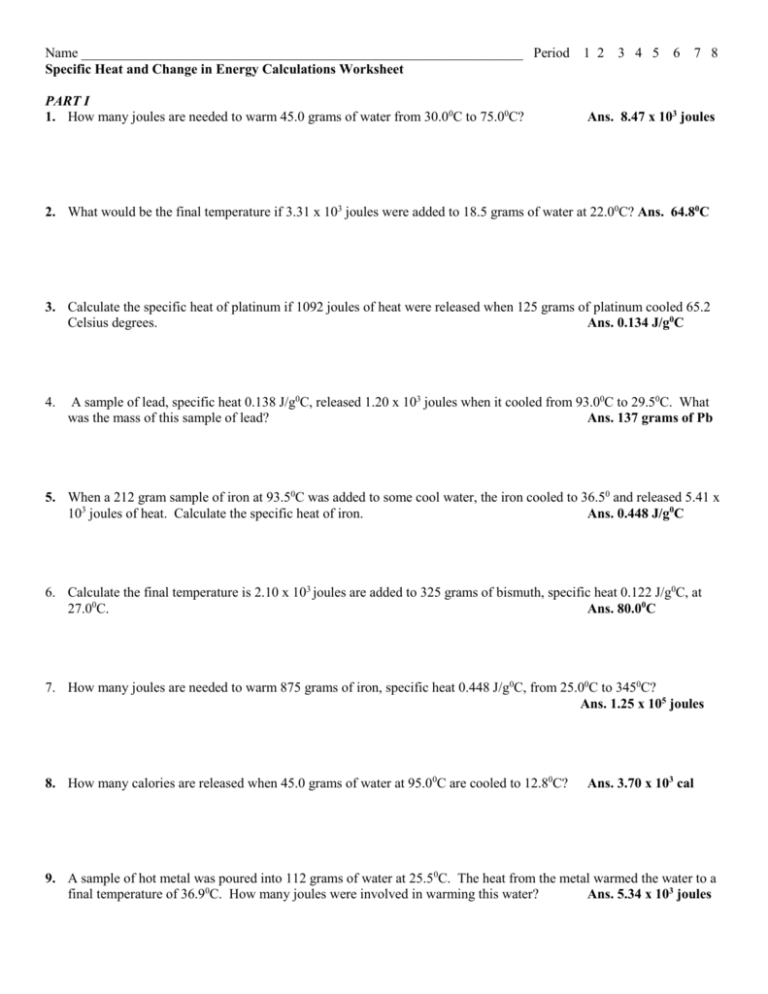
Name ________________________________________________________________ Period 1 2 3 4 5 Specific Heat and Change in Energy Calculations Worksheet PART I 1. How many joules are needed to warm 45.0 grams of water from 30.00C to 75.00C? 6 7 8 Ans. 8.47 x 103 joules 2. What would be the final temperature if 3.31 x 103 joules were added to 18.5 grams of water at 22.00C? Ans. 64.80C 3. Calculate the specific heat of platinum if 1092 joules of heat were released when 125 grams of platinum cooled 65.2 Celsius degrees. Ans. 0.134 J/g0C 4. A sample of lead, specific heat 0.138 J/g0C, released 1.20 x 103 joules when it cooled from 93.00C to 29.50C. What was the mass of this sample of lead? Ans. 137 grams of Pb 5. When a 212 gram sample of iron at 93.50C was added to some cool water, the iron cooled to 36.50 and released 5.41 x 103 joules of heat. Calculate the specific heat of iron. Ans. 0.448 J/g0C 6. Calculate the final temperature is 2.10 x 103 joules are added to 325 grams of bismuth, specific heat 0.122 J/g0C, at 27.00C. Ans. 80.00C 7. How many joules are needed to warm 875 grams of iron, specific heat 0.448 J/g0C, from 25.00C to 3450C? Ans. 1.25 x 105 joules 8. How many calories are released when 45.0 grams of water at 95.00C are cooled to 12.80C? Ans. 3.70 x 103 cal 9. A sample of hot metal was poured into 112 grams of water at 25.50C. The heat from the metal warmed the water to a final temperature of 36.90C. How many joules were involved in warming this water? Ans. 5.34 x 103 joules PART II 1. How many joules are needed to warm 675 grams of water from 12.00C to 85.00C? 2. How many calories are released when 35.0 grams of water at 100.00C are cooled to 0.00C? Ans. 2.06 x 105 J Ans. 3.50 x 103 cal 1. What was the mass of a sample of water if the addition of 4.28 x 103 joules raised the temperature of the sample from 22.00C to 34.50C? Ans. 81.8 grams 2. How many joules are needed to raise the temperature of 500. g of chromium, specific heat 0.448 J/g0C, from 26.00C to 95.00C? Ans. 1.55 x 104 joules 3. What is the specific heat of a sample of an alloy if 3.75 x 103 joules of heat are released when a 315 gram sample of alloy cools from 78.00C to 28.40C? Ans. 0.240 J/g0C 4. The specific heat of iron is 0.448 J/g0C. What will be the final temperature if 3.50 x 104 joules of heat are added to a 454 gram sample of iron at 24.00C? Ans. 1960C 5. A 245 gram sample of a metal at 99.50C was added to a 114 gram sample of water in a perfect calorimeter. The original temperature in the calorimeter was 23.50C. The final temperature of the metal-water mixture was 35.60C. Calculate the specific heat of this metal in joules per gram per Celsius degree. Ans. 0.369 J/g0C 6. Calculate the number of joules needed to warm 275 grams of silver, specific heat 0.236 J/g0C, from 25.00C to 9500C. Ans. 6.00 x 104 Joules 7. What will be the final temperature when 8.75 x 103 joules are added to 75.0 grams of water at 23.00C? Ans. 50.90C 8. 9. When 3.88 x 104 joules were added to a sample of iron, specific heat 0.448 J/g0C, the temperature rose from 24.50C to 1780C. What was the mass of the iron sample? Ans. 5.64 x 102 grams 10. A 315 gram sample of tungsten at 92.50C was added to a 57.7 gram sample of water at 21.20C in a perfect calorimeter. The final temperature of the tungsten-water mixture was 31.80C. Use this data to calculate the specific heat of tungsten Ans. 0.134 J/g0C 11. Calculate the final temperature that results from mixing 245 grams of cobalt, specific heat 0.446 J/g0C, at 1420C with 106 grams of water at 24.80C. Ans. 48.00C
